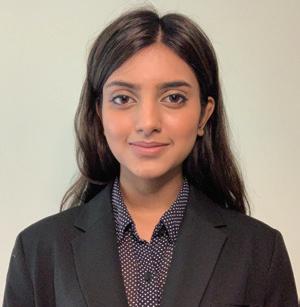
3 minute read
Cold, Displaced and Diabetic: Lessons Learned While Caring for the Refugee Population of Worcester
Akanksha Nagarkar, BS, BA
During my time working as an EMT prior to medical school, I was continually fascinated by how vast medicine is. Not only is it scientifically complex, but there are also many socioeconomic and logistical factors that impact medical care. I often wondered how it was possible to study and learn all that medicine encompasses.
When I entered medical school last year, I quickly became immersed in the lectures and resources that most medical students use to grasp the basics of this multifaceted field. However, it was not until my experience as a care coordinator at the Indian Society of Worcester Free Health Stop that I realized that medicine is best learned from the people for whom we have the opportunity to care. The patients we have the privilege to work with are the experts of their own bodies and circumstances, and they are truly our best teachers. Every patient I have had the opportunity to work with at the free clinic has taught me something about medicine that I will not forget. I would like to share one of these lessons with you.
One of the unique aspects of Worcester is that it is home to many refugee populations. These are resilient people who are fleeing some of the most unimaginable circumstances, and they bring with them a wealth of knowledge. One family, who had quite literally just landed in the United States, arrived at the clinic on a frigid winter evening. As I completed their intake, I noticed they were wearing shorts and T-shirts. When I offered to help them get warmer clothes, they told me the cold was not as bad as it had been in Europe, where they lived outside for months before arriving here. They told me about their life in their home country and how several of their family members had been killed in the civil unrest. Through their life stories, I learned how political unrest impacts families physically and mentally, and how such unrest can have short-term and long-term effects on health outcomes. As I listened to the plight of one of the family members, I was confronted with a series of troubling questions: How is one supposed to carry insulin--which must be refrigerated--across country borders? What do they do if they run out of insulin and are in a different country? How does this impact the patient’s health long-term, and how can we anticipate and prevent the negative effects? Overall, this interaction deepened my knowledge of the barriers that some patients face to adequate healthcare.
As a medical student and physician-in-training, it is easy to get caught up in the academic aspect of medicine. It is easy to forget that we are not studying for hours upon hours for an exam, but rather we are building a strong knowledge base so we can provide the best care possible for our patients. We are working hard so that we can advance medicine and improve the systems through which it is delivered. I am incredibly grateful to the free clinics for reminding me of this every Wednesday. +
Akanksha Nagarkar, BS, BA, is a second-year medical student at UMass Chan Medical School on the Population Urban and Rural Community Health Track and the Clinical and Translational Research Pathway. She is a clinic coordinator at the Indian Society of Worcester Free Health Stop.










